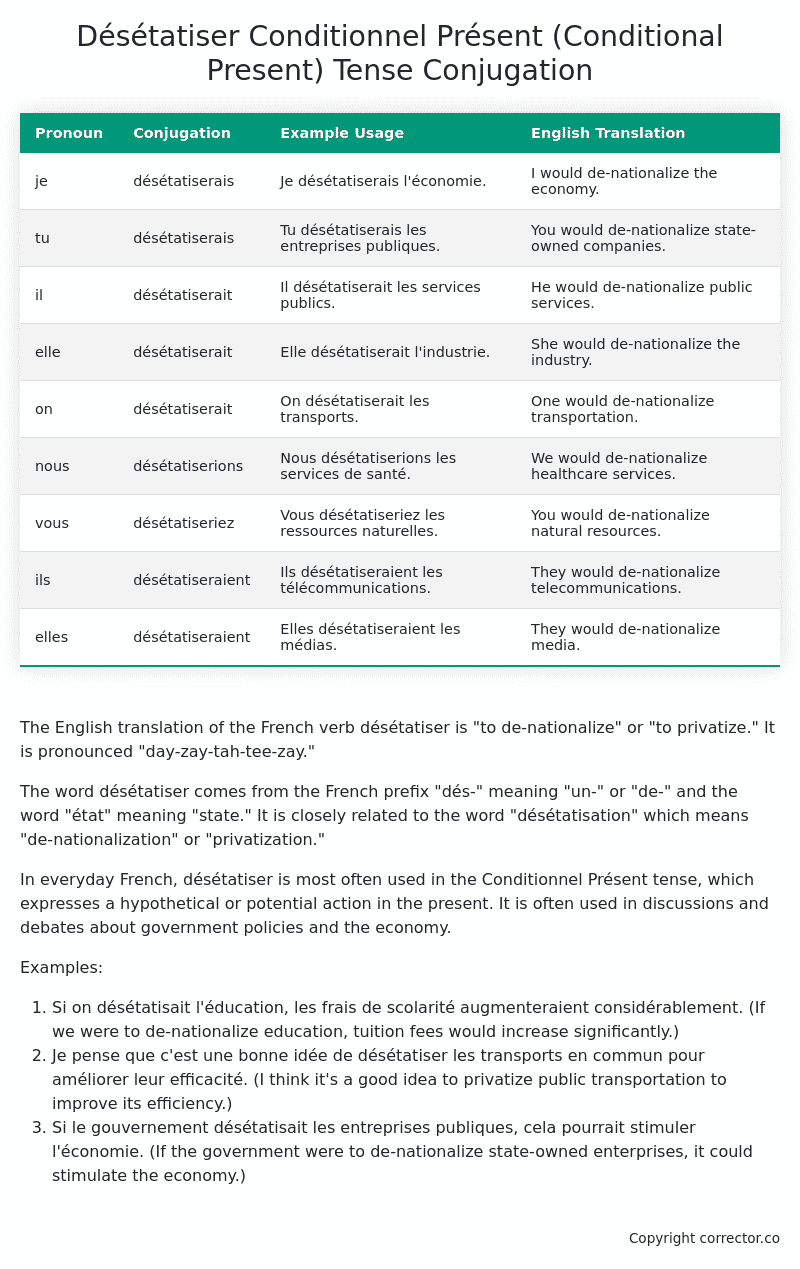Conditionnel Présent (Conditional Present) Tense Conjugation of the French Verb désétatiser
Introduction to the verb désétatiser
The English translation of the French verb désétatiser is “to de-nationalize” or “to privatize.” It is pronounced “day-zay-tah-tee-zay.”
The word désétatiser comes from the French prefix “dés-” meaning “un-” or “de-” and the word “état” meaning “state.” It is closely related to the word “désétatisation” which means “de-nationalization” or “privatization.”
In everyday French, désétatiser is most often used in the Conditionnel Présent tense, which expresses a hypothetical or potential action in the present. It is often used in discussions and debates about government policies and the economy.
Examples:
- Si on désétatisait l’éducation, les frais de scolarité augmenteraient considérablement. (If we were to de-nationalize education, tuition fees would increase significantly.)
- Je pense que c’est une bonne idée de désétatiser les transports en commun pour améliorer leur efficacité. (I think it’s a good idea to privatize public transportation to improve its efficiency.)
- Si le gouvernement désétatisait les entreprises publiques, cela pourrait stimuler l’économie. (If the government were to de-nationalize state-owned enterprises, it could stimulate the economy.)
Table of the Conditionnel Présent (Conditional Present) Tense Conjugation of désétatiser
| Pronoun | Conjugation | Example Usage | English Translation |
|---|---|---|---|
| je | désétatiserais | Je désétatiserais l’économie. | I would de-nationalize the economy. |
| tu | désétatiserais | Tu désétatiserais les entreprises publiques. | You would de-nationalize state-owned companies. |
| il | désétatiserait | Il désétatiserait les services publics. | He would de-nationalize public services. |
| elle | désétatiserait | Elle désétatiserait l’industrie. | She would de-nationalize the industry. |
| on | désétatiserait | On désétatiserait les transports. | One would de-nationalize transportation. |
| nous | désétatiserions | Nous désétatiserions les services de santé. | We would de-nationalize healthcare services. |
| vous | désétatiseriez | Vous désétatiseriez les ressources naturelles. | You would de-nationalize natural resources. |
| ils | désétatiseraient | Ils désétatiseraient les télécommunications. | They would de-nationalize telecommunications. |
| elles | désétatiseraient | Elles désétatiseraient les médias. | They would de-nationalize media. |
Other Conjugations for Désétatiser.
Le Present (Present Tense) Conjugation of the French Verb désétatiser
Imparfait (Imperfect) Tense Conjugation of the French Verb désétatiser
Passé Simple (Simple Past) Tense Conjugation of the French Verb désétatiser
Passé Composé (Present Perfect) Tense Conjugation of the French Verb désétatiser
Futur Simple (Simple Future) Tense Conjugation of the French Verb désétatiser
Futur Proche (Near Future) Tense Conjugation of the French Verb désétatiser
Plus-que-parfait (Pluperfect) Tense Conjugation of the French Verb désétatiser
Passé Antérieur (Past Anterior) Tense Conjugation of the French Verb désétatiser
Futur Antérieur (Future Anterior) Tense Conjugation of the French Verb désétatiser
Subjonctif Présent (Subjunctive Present) Tense Conjugation of the French Verb désétatiser
Subjonctif Passé (Subjunctive Past) Tense Conjugation of the French Verb désétatiser
Subjonctif Imparfait (Subjunctive Imperfect) Tense Conjugation of the French Verb désétatiser
Conditionnel Présent (Conditional Present) Tense Conjugation of the French Verb désétatiser (this article)
Conditionnel Passé (Conditional Past) Tense Conjugation of the French Verb désétatiser
L’impératif Présent (Imperative Present) Tense Conjugation of the French Verb désétatiser
L’infinitif Présent (Infinitive Present) Tense Conjugation of the French Verb désétatiser
Struggling with French verbs or the language in general? Why not use our free French Grammar Checker – no registration required!
Get a FREE Download Study Sheet of this Conjugation 🔥
Simply right click the image below, click “save image” and get your free reference for the désétatiser Conditionnel Présent tense conjugation!

Désétatiser – About the French Conditionnel Présent (Conditional Present) Tense
Formation
Common Everyday Usage Patterns
Expressing Polite Requests
Expressing Hypothetical Situations
Expressing Doubt or Uncertainty
Interactions with Other Tenses
Present Tense
Past Tense
Future Tense
Conditional Perfect
Summary
Want More?
I hope you enjoyed this article on the verb désétatiser. Still in a learning mood? Check out another TOTALLY random French verb conjugation!


